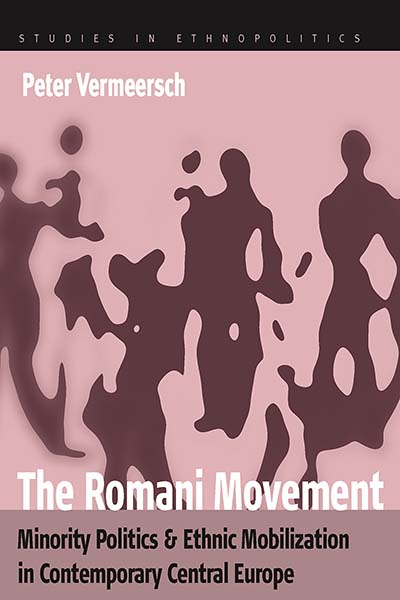
Series
Volume 4
Ethnopolitics
Email Newsletters
Sign up for our email newsletters to get customized updates on new Berghahn publications.
The Romani Movement
Minority Politics and Ethnic Mobilization in Contemporary Central Europe
Peter Vermeersch
280 pages, 7 tables, bibliog., index
ISBN 978-1-84545-164-6 $135.00/£104.00 / Hb / Published (August 2006)
ISBN 978-1-84545-102-8 $34.95/£27.95 / Pb / Published (December 2007)
eISBN 978-0-85745-678-6 eBook
Reviews
"His book is a conscientious comparative study of why Gypsies in Hungary, the Czech Republic and Slovakia have failed to mobilize effectively in pursuit of their objectives. Vermeersch sets out meticulously the changes in their condition dating back a decade and a half in each country, and discusses their impacts." · Slavonic and East European Review
“This new study by Peter Vermeersch makes an important and original contribution to an under-researched area. Concentrating on ‘the role of Roma and their supporters as political actors’, his book is invaluable for the analytical insights it brings to bear and as a rich source of empirical information on recent Romani mobilisation in Central Europe…This comprehensive, thoroughly researched and enlightening study, assisting better understanding and effectiveness of this process, is to be warmly welcomed.” · Romani Studies
“While much of the text relies on secondary literature and existing surveys, Vermeersch provides his reader with a wealth of analysis based on personal interviews with prominent Romani activists…The Romani Movement is a text of clear value to students of European politics, specifically those interested in contemporary issues in the field of ethnicity." · Transitions online
Description
The collapse of communism and the process of state building that ensued in the 1990s have highlighted the existence of significant minorities in many European states, particularly in Central Europe. In this context, the growing plight of Europe’s biggest minority, the Roma (Gypsies), has been particularly salient. Traditionally dispersed, possessing few resources and devoid of a common “kin state” to protect their interests, the Roma have often suffered from widespread exclusion and institutionalized discrimination. Politically underrepresented and lacking popular support amongst the wider populations of their host countries, the Roma have consequently become one of Europe’s greatest “losers” in the transition towards democracy.
Against this background, the author examines the recent attempts of the Roma in Central Europe and their supporters to form a political movement and to influence domestic and international politics. On the basis of first-hand observation and interviews with activists and politicians in the Czech Republic, Hungary and Slovakia, he analyzes connections between the evolving state policies towards the Roma and the recent history of Romani mobilization. In order to reach a better understanding of the movement’s dynamics at work, the author explores a number of theories commonly applied to the study of social movements and collective action.
Peter Vermeersch received his PhD from the University of Leuven (KU Leuven), Belgium, where he is currently Assistant Professor in East European politics and Postdoctoral Research Fellow of the Belgian National Fund for Scientific Research. He is the author of several journal articles on minority politics and ethnic mobilization in Central Europe.

